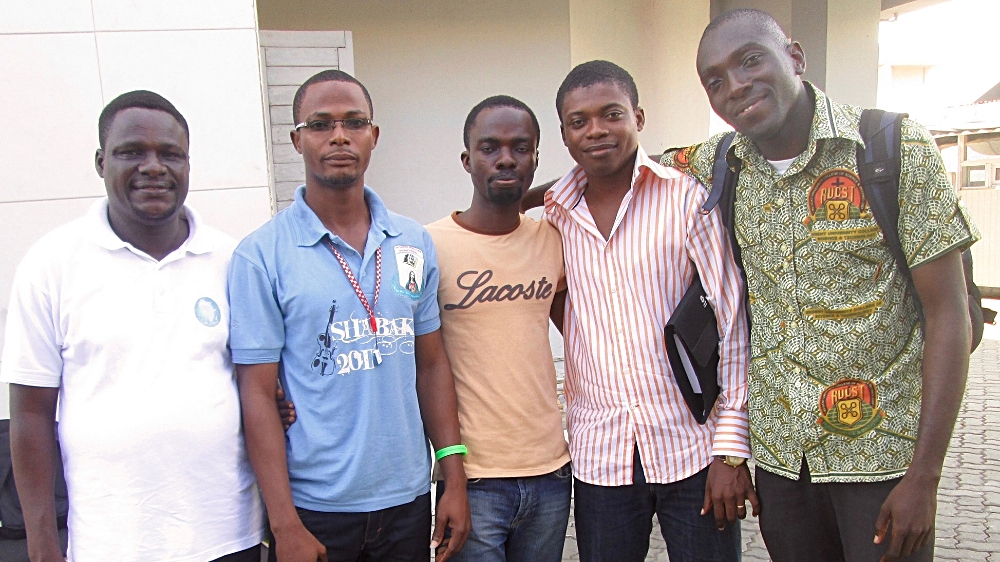In today's age of media buzz, an insatiable craving for the limelight and wealth is leading many to misconstrue the qualities of leadership. The African village boy in me makes me imagine today's leaders in terms that are analogous with fruit and seeds. For instance, in my village, blooming flowers precede the mango fruit. The flowers are beautiful and attractive to bugs, but their span is short. Then the fruit grows, ripens, and gets harvested. The seed, however, takes time to dry, germinate and grow into a fruit-bearing mango tree. The process takes years, but eventually, in every season it bears fruit after its kind and provides shade. Mango trees also help protect roofs during the rainy and windy seasons in Katanga. Like an individual fruit, one-season leaders appear today and are gone tomorrow – either by casualty or self-inflicted wounds.
For the letter 'M' in my leadership alphabet, I explore the idea of dedicated and enduring leadership that is marked by character, clear thinking, and honor. Like the seed, these leaders embody stories and values that shape how they lead. They have learned from tragedies and triumphs and strive to make meaningful contributions. In a nutshell, they become empowering agents helping ordinary folks become extraordinary people in society.
I have learned that good leaders are neither hoppers in search of bigger checks nor butterflies looking for visibility. Instead, they are people dedicated to utilizing their prowess to meet human needs. Their attitude, love for people, and integrity tend to generate high morale in others. Leadership is challenging in a time where everyone has a social media platform on which to share their thoughts. Indeed, the 'M' is not for manipulation but for matchless zest to do what is right.
'M' is for Manage
The accelerating pace of social trends and the general desire for speed – an impatient hastiness of sorts – are forces that seem to undermine sustained leadership. However, the merits of stability and trust are sufficient grounds to retain leaders with the ability to manage. These leaders stay long enough to know the people and the product well. Today's workers come from broken homes and broken lives in search of meaning and belonging. Leaders able to manage change with a clear sense of direction and long-term goals understand that people are not disposable commodities. Good leaders always explore ways to improve their ability to manage change, people, and organizational culture. Note: I am not here differentiating between leaders and managers. Instead, I prefer to make distinctions between frontline and less visible roles of leadership.
On April 27, 2019, an unfortunate shooting incident occurred at the Chabad of Poway Synagogue in California, north of San Diego. A female witness later shared with the press about the posture of the Rabbi. She told how the Rabbi, who sustained gunshot wounds, nevertheless managed the situation and still returned to serve in the celebration of the last day of Passover. This Rabbi diligently managed crisis and fear under pressure. Members looked at his reaction to inform their own sense of security. People look up to leaders to be proverbial thermostats in unusual conditions. Good leaders create an atmosphere of comradery, peaceful human interaction, and a vibe of tranquility.
Manage your emotional, mental, and spiritual health at a personal level. These affect how you function in the workplace. Try to manage your team like a family, every problem as an opportunity for growth, and people as if your success depended upon them. Remember, empathy is not a mere speech. Dare to manage with care!
'M' is for the Mind
A wise man once said, 'A man is commended according to his good sense, but one of twisted mind is despised' (Prov. 12:8 ESV). A leader's mind is the unseen engine for cutting edge innovation and social engineering. Everyone has a brain but not everyone possesses the intellect of a leader. Whether born or nurtured, leaders should always work on their ability to think clearly, cast vision, and execute prudently. The ancient virtue of sober-mindedness is an essential quality today. Leaders who cultivate healthy minds see clearly and stay focused. The mind scarred by pain and fueled by lucre produces terrible working conditions. A clear mind, however, enables clear communication.
Endeavor to grow in intellectual curiosity and capacity as a leader. Study other leaders and learn about people at the receiving end of the decisions you make. Try reading, listening to audiobooks, podcasts, and interacting with people in different disciplines. For me, regular exposure to nature has been refreshing to my sensibilities and creative thought patterns. As the maxim goes, 'garbage in, garbage out' – it matters a lot to be mindful about what you feed your mind. A sound mind attracts reasonable people. Good leaders exercise sound moral judgment and discernment. Prudence is power in a world that is increasingly deferring decisions to artificial intelligence.
'M' is for Money
Bernie Madoff was a New York City magnate who traded his mansions for prison due to his craving for money. Madoff sits in jail today serving a life sentence for defrauding trusted friends, among others. Indeed, 'he who loves money will not be satisfied with money, nor he who loves wealth with his income; this also is vanity' (Eccl. 5:10). Money can transform good people into greedy junkies. Character flaws have ensnared unwise leaders in this regard.
It was Bion of Borysthenes (325 - 250 BCE) who once said, the 'love of money is the mother-city of all evils.' When leaders allow their love of money to rise above their passion for human dignity, disaster is the outcome. Unfortunately, I find that there are few religious leaders we can trust with money designated for the poor, vulnerable, and displaced on their watch. Religion is too often the instrument that masks the truth and manipulates the innocent for monetary gains. Money reveals the virtues and vices of leaders. The wise words of Epictetus still ring true: 'Wealth consists not in having great possessions, but in having few wants.' Leaders who make a positive impact tend to have a healthy relationship with money. These responsible leaders are stewards who resist every temptation to exploit others. 'The love of money is a root of all kinds of evils. It is through this craving that some have wandered away from the faith and pierced themselves with many pangs' (1 Tim 6:10 ESV).
'M' is for Mastery
Many people want to be leaders, but only a few can lead. An estimated 15–20% of the human population are leaders. Some are frontline leaders, whereas others excel in associate roles. Whatever level or capacity, it is imperative to be good at your trade. Mastery is what distinguishes real leaders from those who confuse pay increase and titles for leadership. A mastery of people skills, cultural intelligence, and industry knowledge are indispensable and require continual growth. A famous adage in my African childhood went, 'do not try to be the Jack of all trades and master of none.' You do not need to be an expert in every area, but you need to be well informed and trust expert knowledge.
One of the greatest needs of our century are leaders who know how to work with highly competent people. 21st-century leadership requires courage, credibility, and competence to command respect. An appreciation for diversity and cultural competence to deal with people from different backgrounds are invaluable assets for productivity and innovation. Leaders who know their trade emit positive vibes and attract talent. It all begins with the realization that that none of us knows it all. There is something new to learn every day. Leadership mastery produces confident and trusting associates.
'M' is for Modesty
The privilege to know John Stott exposed me to another level of modesty. The great Christian leader in England used to admonish people to 'live a simple lifestyle so that others may simply live.' He modeled humility as well as the fact that leaders who make the most impact are the ones who have chosen humility over pride. Although he experienced an aristocratic upbringing, elite education, and global popularity, he did not go the route of bragging but opted for a modest lifestyle instead. That challenged African village boys like me who did not have that upbringing to conclude that it is easier for me to choose a lifestyle of modesty.
Modesty deflates ostentation and allows meekness, respect, and grace to flourish. Modest leaders know who they are, have no need for special attention, and appreciate the opportunity to serve others. They believe in the golden rule – to 'do unto others as you would have them do unto you' and expect their associates to follow suit. They make those who take their meekness for weakness regret it. I know leaders who are humble and introverted, whose associates are excited to give of their all for shared success. I also know leaders who are extroverted and bossy, whose associates provide only the minimum required of them.
Personality is not always the right place to measure character. Beware of equating elegance with pride. For some people, elegance projects their taste for quality. It has become a truism that, 'the firm, the enduring, the simple, and the modest are near to virtue' (Confucius). The character of a good leader attracts dedicated followers. Modesty is where moral virtue and manners meet.
'M' is for Magnet
People want to be famous these days and will do everything to achieve that. Social media provides incredible access to popular and leadership psychology. It is easier than ever to learn about what attracts leaders and what they value. Leaders attract people who share their values. Yes! Whether you know it or not, you project your values on social media, wherever you go, and in whatever you do. Magnets generate magnetic fields which draw paramagnetic (aluminum or tin) and ferromagnetic (iron, steel, nickel, etc.) materials to that magnet. A ferromagnetic material is particularly drawn forcefully and sticks firmly to magnets. However, a magnet repels mercury, copper, and silver. The difference is in the properties of the magnet and the objects of attraction. Likewise, every leader attracts and repels. As magnets are known for what they attract, magnetic leadership is often associated with those who attract competent people, generate high morale, and execute prudently. The same leaders may not know how much or how many they repel.
Dubious people attract shady characters. It is a misconception that likability is always good for business. The people who stick with you reveal something about your values and style. Credible magnetic leaders embody integrity and a genuine desire to see others succeed. They communicate clearly and lead with a clear sense of direction. What they say and what they do are congruent. They strive to know their associates and understand their needs. They commend productivity and condemn complacency with candor. Diligent and decent people are excited to work for them. Magnetic leaders love people. Their sense of fairness makes associates feel secure and valued. Leaders attract their kind – not who they think they deserve or wish to become. So, reconfigure your properties, and you might draw the right people for the right cause.
The 'M' in the leadership alphabet calls for competency, consistency, and character in a world obsessed with speed and temporary endeavors. In my few years in leadership, I have never witnessed so many competent people so insecure in themselves as I see nowadays. Leaders who manage with manners, modesty, and mastery engender confidence in associates. Leadership intellect is a gift that must be harnessed and enhanced by those who have it. Those who don't have it must be careful in frontline leadership as the 'speed culture' is notorious for how it exposes the poor judgment of the right people in the wrong places. Remember, leadership is about leading real people. Strive to be your authentic self, not a chameleon.






